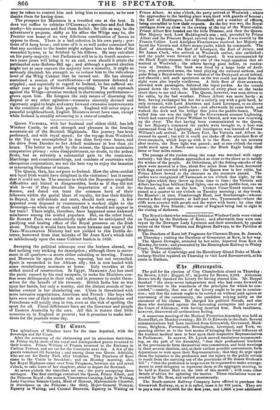Ilbe Court.
TEE splendours of Windsor have for the time departed, with the Sovereign and Iter Court.
After the ceremony of the christening and its attendant festivities, 011 Friday night, most of the royal and distinguished guests returned to their homes. Prince William of Prussia returned to the Embassy in Carlton Terrace, and set out for the Continent next day. A few of the guests remained till Saturday ; and among them was Queen Adelaide, who set out for Bushy Park after breakfast. The Dutchess of Kent came to the Castle to breakfast ; and on Monday morning, also, her Royal Highness came over from Frogmore, between six and seven o'clock, to take leave of her daughter, about to depart for Scotland. At seven o'clock the travellers set out ; the party occupying three carriages. The first carriage contained the Queen, Prince Albert, and the Princess Royal ; the second, Viscountess Canning, Lady in Waiting, Lady Caroline Somers Cocks, Maid of Honour, Mademoiselle Charrier, in attendance on the Princess ; the third, Major-General Wemyss, Equerry in Waiting, and Colonel Bonverie, Equerry in Waiting on Prince Albert. At nine o'clock, the party arrived at Woolwich ; where the approaches to the landing-place ware lined with guards of honour; the Earl of Haddington, Lord Bloomfield, and a number of officers, being assembled to bow their respects. As the day was wet, the Royal carriages drew up close to the awning at the top of the Water-stairs. Prince Albert first handed out the little Princess, and then the Queen. Her Majesty took Lord Haddington's arm ; and, preceded by Prince Albert and the Princess Royal, entered the barge. It was steered by Sir Francis Collier. Lord Adolphus Fitzclarence received her Majesty on board the Victoria and Albert steam-yacht, which he commands. The Earl of Aberdeen, the Earl of Liverpool, the Earl of Jersey, and Sir James Clark, who arrived at Woolwich earlier, also embarked ; and the yacht went forward at half-speed. It was accompanied by the Black Eagle steamer, the only one of the royal squadron that re- mained at Woolwich ; the others having gone before, to rendez- vous at Dundee. The bank was lined by a large body of Artil- lery, who presented arms, the band playing the national anthem, and guns firing a Royal salute ; the workmen of the Dockyard stood behind, and cheered ; and such spectators as the wet could not deter from the sight were also loyally vociferous. A little fleet of river-steamers, crowded with passengers, followed the royal yachts. AS the vessels passed down the river, the inhabitants of every place on the banks stood there to see and cheer. The Queen, however, was soon driven to the cabin, by the bad weather. Prince Albert was more hardy : at first, having exchanged his hat for a sailorly cap with a gold band, he only retreated, with Lord Aberdeen and Lord Liverpool, to an alcove behind the starboard paddle-box ; and afterwards he came forth, and walked the deck and the bridge that joins the paddle-boxes. What called him out was the sight of the Government steamer Lightning, which had conveyed Prince William to Ostend, and was now returning up the river. The fact having been communicated to the Queen, by her Majesty's command the yachts were brought to, a boat was summoned from the Lightning, and intelligence was learned of Prince William's safe arrival. At Tilbury Fort, the Victoria and Albert in- creased its speed ; but still it could not shake off the attendant fleet of river-steamers, which kept up with it to the Nore. .At ten minutes after twelve, the Nore light was passed ; and at one o'clock the royal yacht stood upon a North-east course ; the Black Eagle being than three or four miles astern.
The passage of the yachts along the coast was watched with eager curiosity ; but they seldom approached so close to the shore as to satisfy the wishes of the people. At Orfordness, all the fishing-smacks of the place were moored in a line, about five miles from the land, decorated with flags and crowded with gazers : the Queen was in her cabin, but Prince Albert bowed to the cheerers as the steamers passed. The yachts were recognized off Yarmouth at ten o'clock that night, by the blue lights which they threw up from time to time ; the Victoria and Albert having four brilliant fixed lights, one on each paddle-box, one on the funnel, and one on the bow. Cromer Coast-Guard station was passed at a quarter to one o'clock on Tuesday morning ; at day-break, the Humber ; at nine, Flamborough Head, and Scarborough—whence started a fleet of spectators ; at half-past two, Tynemouth—where the cliffs were covered with people and the water with boats ; by nine that evening, the Fern Islands ; the coast of England being lost to sight in the closing of darkness.
The Royal infants who remained behind at Windsor Castle were visited on Tuesday by the Dutchess of Kent ; and afterwards they were con- veyed by the Dowager Lady Lyttleton and their attendants, by special trains on the Great Western and Brighton Railways, to the Pavilion at Brighton.
The Dutchess of Kent left Frogmore for Clarence House, St. James's, on Thursday ; visiting the Dutchess of Gloucester, at Kew, in her way.
The Queen Dowager, attended by her suite, departed from Kew on Monday, for town ; and proceeded by the Birmingham Railway to Witley Court, in Worcestershire.
The Duke of Cambridge and the Hereditary Grand Duke of Meek- lenbarg-Strelitz repaired on Thursday to visit Lord Ravensworth, at his castle in Durham.


























 Previous page
Previous page